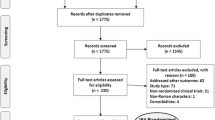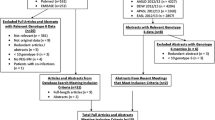Abstract
Background and Objectives
Hepatitis C treatment has changed considerably in recent years, and many interferon (IFN)-free therapies are now available. Considering the high rates of sustained virological response (SVR) presented by clinical trials for these treatments, high rates of effectiveness are also expected in real-world clinical practice. Hence, this study aimed to conduct a systematic review and meta-analysis of observational cohort studies to evaluate the clinical effectiveness and safety of IFN-free therapies for hepatitis C.
Methods
The search was performed in four electronic databases and included cohort studies that evaluated IFN-free schemes and provided data on SVR at 12 weeks after the end of treatment (SVR12) as the primary outcome. Overall and subgroup meta-analyses of patients’ clinical conditions (e.g. co-infection with human immunodeficiency virus (HIV), cirrhosis, liver transplant, specific genotypes, and other conditions) were performed.
Results
Sixty-eight studies encompassing a total of 24,151 patients were included for quantitative and qualitative analyses, evaluating six treatments: sofosbuvir with ledipasvir, daclatasvir, or simeprevir; daclatasvir with asunaprevir; paritaprevir/ritonavir in combination with ombitasvir and dasabuvir; and sofosbuvir with ribavirin. The overall analysis showed SVR rates of 88–96% for all treatments except sofosbuvir combined with ribavirin, which had SVR rates of approximately 80%. The results of subgroup analyses showed that the genotype 3 virus appears to be the most difficult to treat.
Conclusion
In order to choose the best treatment option, it is necessary to consider the patients’ conditions and characteristics. In conclusion, the use of IFN-free therapies meets the high expectations created by clinical trials, including patients in special clinical conditions.




Similar content being viewed by others
References
World Health Organization (WHO). Hepatitis C fact sheet no. 164 (updated July 2017). http://www.who.int/mediacentre/factsheets/fs164/en/. Accessed 10 Aug 2017.
EASL. EASL clinical practice guidelines: management of hepatitis C virus infection. J Hepatol. 2011;55:245–64.
Sulkowski MS, Cooper C, Hunyady B, Jia J, Ogurtsov P, Peck-Radosavljevic M, et al. Management of adverse effects of Peg-IFN and ribavirin therapy for hepatitis C. Nat Rev Gastroenterol Hepatol. 2011;8:212–23.
EASL. EASL recommendations on treatment of hepatitis C 2015. J Hepatol. 2015;63:199–236.
American Association for the Study of Liver Diseases. Hepatitis C guidance: AASLD-IDSA recommendations for testing, managing, and treating adults infected with hepatitis C virus. Hepatology. 2015;62:932–54.
Ahmed H, Abushouk AI, Menshawy A, Mohamed A, Negida A, Loutfy SA, et al. Safety and efficacy of ombitasvir/paritaprevir/ritonavir and dasabuvir with or without ribavirin for treatment of hepatitis C virus genotype 1: a systematic review and meta-analysis. Clin Drug Investig. 2017;37:1009–23.
World Health Organization. Guidelines for the screening care and treatment of persons with chronic hepatitis C infection. Updated version, 2016. Geneva: World Health Organization; 2016.
Ferreira VL, Tonin FS, Assis Jarek NA, Ramires Y, Pontarolo R. Efficacy of Interferon-free therapies for chronic hepatitis C: a systematic review of all randomized clinical trials. Clin Drug Investig. 2017;37(7):635–46.
Ferreira VL, Assis Jarek NA, Tonin FS, Borba HH, Wiens A, Muzzillo DA, et al. Ledipasvir/sofosbuvir with or without ribavirin for the treatment of chronic hepatitis C genotype 1: A pairwise meta-analysis. J Gastroenterol Hepatol. 2017;32(4):749–55.
Ferreira VL, Assis Jarek NA, Tonin FS, Borba HH, Wiens A, Pontarolo R. Safety of interferon-free therapies for chronic hepatitis C: a network meta-analysis. J Clin Pharm Ther. 2016;41(5):478–85.
Mariani AW, Pego-Fernandes PM. Observational studies: why are they so important? Sao Paulo Med J. 2014;132:01–2.
Ligthelm RJ, Borzì V, Gumprecht J, Kawamori R, Wenying Y, Valensi P. Importance of observational studies in clinical practice. Clin Ther. 2007;29:1284–92.
O’Neil M, Berkman N, Hartling L, Chang S, Anderson J, Motu’apuaka M, et al. Observational evidence and strength of evidence domains: case examples. Syst Rev. 2014;3:35.
Schünemann HJ, Tugwell P, Reeves BC, Akl EA, Santesso N, Spencer FA, et al. Non-randomized studies as a source of complementary, sequential or replacement evidence for randomized controlled trials in systematic reviews on the effects of interventions. Res Synth Methods. 2013;4:49–62.
Barnish MS, Turner S. The value of pragmatic and observational studies in health care and public health. Pragmat Obs Res. 2017;8:49–55.
DiPietro NA. Methods in epidemiology: observational study designs. Pharmacotherapy. 2010;30:973–84.
Liberati A, Altman DG, Tetzlaff J, Mulrow C, Gøtzsche PC, Ioannidis JPA, et al. The PRISMA statement for reporting systematic reviews and meta-analyses of studies that evaluate healthcare interventions: explanation and elaboration. BMJ. 2009;339:b2700.
Higgins JPT, Green S. Cochrane handbook for systematic reviews of interventions version 5.1.0. Copenhagen: Cochrane Collaboration; 2011.
Stroup DF, Berlin JA, Morton SC, Olkin I, Williamson GD, Rennie D, et al. Meta-analysis of observational studies in epidemiology: a proposal for reporting. Meta-analysis Of Observational Studies in Epidemiology (MOOSE) group. JAMA. 2000;283:2008–12.
Turner RM, Bird SM, Higgins JP. The impact of study size on meta-analyses: examination of underpowered studies in Cochrane reviews. PLoS One. 2013;8:e59202.
Wells GA, Shea B, O’Connell D, Peterson J, Welch V, Losos M, et al. The Newcastle-Ottawa Scale (NOS) for assessing the quality of nonrandomised studies in meta-analyses. Ottawa: Ottawa Hospital Research Institute; 2013.
Gomaa A, Allam N, Elsharkway A, El Kassas M, Waked I. Hepatitis C infection in Egypt: prevalence, impact and management strategies. Hepat Med. 2017;9:17–25.
Curry MP, O’Leary JG, Bzowej N, Muir AJ, Korenblat KM, Fenkel JM, et al. Sofosbuvir and velpatasvir for HCV in patients with decompensated cirrhosis. N Engl J Med. 2015;373:2618–28.
Feld JJ, Jacobson IM, Hézode C, Asselah T, Ruane PJ, Gruener N, et al. Sofosbuvir and velpatasvir for HCV genotype 1, 2, 4, 5, and 6 infection. N Engl J Med. 2015;373:2599–607.
Foster GR, Afdhal N, Roberts SK, Brau N, Gane EJ, Pianko S, et al. Sofosbuvir and velpatasvir for HCV genotype 2 and 3 infection. N Engl J Med. 2015;373:2608–17.
Gane E, Lawitz E, Pugatch D, Papatheodoridis G, Bräu N, Brown A, et al. Glecaprevir and pibrentasvir in patients with HCV and severe renal impairment. N Engl J Med. 2017;377:1448–55.
Author information
Authors and Affiliations
Corresponding author
Ethics declarations
Funding
None.
Conflict of interest
Vinicius Lins Ferreira, Letícia Paula Leonart, Fernanda Stumpf Tonin, Helena Hiemisch Lobo Borba, and Roberto Pontarolo declare no relevant conflicts of interest.
Electronic supplementary material
Below is the link to the electronic supplementary material.
Rights and permissions
About this article
Cite this article
Ferreira, V.L., Leonart, L.P., Tonin, F.S. et al. Sustained Virological Response in Special Populations with Chronic Hepatitis C Using Interferon-Free Treatments: A Systematic Review and Meta-analysis of Observational Cohort Studies. Clin Drug Investig 38, 389–400 (2018). https://doi.org/10.1007/s40261-018-0624-6
Published:
Issue Date:
DOI: https://doi.org/10.1007/s40261-018-0624-6




